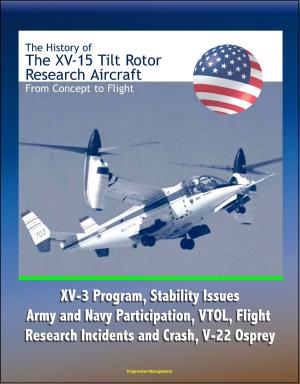Enabling Others to Win in a Complex World: Maximizing Security Force Assistance Potential in the Regionally Aligned Brigade Combat Team - Iraqi Freedom, Relevance to Contemporary Environment
Nonfiction, History, Military, United States| Author: | Progressive Management | ISBN: | 9781311855381 |
| Publisher: | Progressive Management | Publication: | March 4, 2016 |
| Imprint: | Smashwords Edition | Language: | English |
| Author: | Progressive Management |
| ISBN: | 9781311855381 |
| Publisher: | Progressive Management |
| Publication: | March 4, 2016 |
| Imprint: | Smashwords Edition |
| Language: | English |
Professionally converted for accurate flowing-text e-book format reproduction, this study seeks to answer how the Army's principal tactical formation—the brigade combat team — can best respond to this challenge and opportunity. Drawing upon extensive research into the Army's advisory efforts in Operation IRAQI FREEDOM, Captain Walsh concludes that the Army must learn several key lessons in how it conducts security force assistance. Primary among these lessons is the imperative to get the right personnel into advisory roles, the need to ensure unity of effort between the operational and advisory missions, and the need to optimize the brigade combat team for security force assistance if it is to conduct that mission.
Captain Walsh examines the opportunities that the brigade combat team currently has in conducting security force assistance in today's operating environment. Drawing from the lessons of Iraq and current national security strategy, the author advocates that the brigade combat team can be a powerful force for the combatant commanders in the realm of conflict prevention, but that many of the lessons of Iraq are at risk of being lost. He further argues that changes should be made within the Army to make the brigade combat team more effective at security force assistance if tasked to conduct that mission.
The author provides five recommendations for the Army to increase the effectiveness of brigade combat teams when they are providing security force assistance. First, he calls for the Army to align the majority of its brigade combat teams with geographic combatant commands, thereby allowing the brigades to focus their training on a specific area of operations, while providing the combatant commanders with a more effective product. Next, he suggests the Army should reform its personnel policies to allow Soldiers to stay primarily aligned with units in the combatant command with which they have experience, creating more regional expertise and enabling enduring relationships with partner militaries. Third, he advocates for aligning conventional forces with collocated Special Forces Groups on military installations, creating the conditions for continued interdependence between the two, but also drawing on the inherent advisory capabilities found in Special Forces to help conventional forces prepare for this mission. Fourth, he calls for the creation of an "army advisor" corps, whose mission would be to conduct tactical and operational advising to host nation security forces, while also providing the ability to embed in conventional units tasked to conduct security force assistance to increase their capacity for that mission. Finally, he calls for the permanent assignment of those "Army advisors" down to the battalion level as a means to assist unit commanders to train host nation security forces, or to provide stand-alone advisory packages if needed.
Professionally converted for accurate flowing-text e-book format reproduction, this study seeks to answer how the Army's principal tactical formation—the brigade combat team — can best respond to this challenge and opportunity. Drawing upon extensive research into the Army's advisory efforts in Operation IRAQI FREEDOM, Captain Walsh concludes that the Army must learn several key lessons in how it conducts security force assistance. Primary among these lessons is the imperative to get the right personnel into advisory roles, the need to ensure unity of effort between the operational and advisory missions, and the need to optimize the brigade combat team for security force assistance if it is to conduct that mission.
Captain Walsh examines the opportunities that the brigade combat team currently has in conducting security force assistance in today's operating environment. Drawing from the lessons of Iraq and current national security strategy, the author advocates that the brigade combat team can be a powerful force for the combatant commanders in the realm of conflict prevention, but that many of the lessons of Iraq are at risk of being lost. He further argues that changes should be made within the Army to make the brigade combat team more effective at security force assistance if tasked to conduct that mission.
The author provides five recommendations for the Army to increase the effectiveness of brigade combat teams when they are providing security force assistance. First, he calls for the Army to align the majority of its brigade combat teams with geographic combatant commands, thereby allowing the brigades to focus their training on a specific area of operations, while providing the combatant commanders with a more effective product. Next, he suggests the Army should reform its personnel policies to allow Soldiers to stay primarily aligned with units in the combatant command with which they have experience, creating more regional expertise and enabling enduring relationships with partner militaries. Third, he advocates for aligning conventional forces with collocated Special Forces Groups on military installations, creating the conditions for continued interdependence between the two, but also drawing on the inherent advisory capabilities found in Special Forces to help conventional forces prepare for this mission. Fourth, he calls for the creation of an "army advisor" corps, whose mission would be to conduct tactical and operational advising to host nation security forces, while also providing the ability to embed in conventional units tasked to conduct security force assistance to increase their capacity for that mission. Finally, he calls for the permanent assignment of those "Army advisors" down to the battalion level as a means to assist unit commanders to train host nation security forces, or to provide stand-alone advisory packages if needed.















